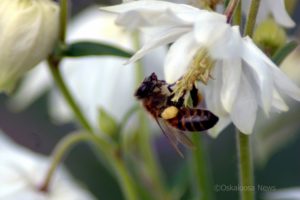Learning To Become Beekeepers To Preserve The Future
Oskaloosa, Iowa – Many a heart skips a beat when they see that bee lands near them, or on them. They are often dealt a quick swat, and we feel a sense of relief.
For honey bees, survival is becoming more difficult all the time, and with it, one of the major pollinators of the plant life around us. The honey bee pollinates nearly 1/3 of all the food we eat.
On Friday evening, a group of individuals interested in learning more about beekeeping continued their education, thanks in part to Jim Marshall.
Marshall is the go-to guy around the area when a swarm of honey bees is located.
He’s using that knowledge of bees to help a new crop of beekeepers learn more about building and maintaining their own bees.
For Marshall, it’s worth the time and energy to train others because “I think that our honeybees are needing help.”
“If we want to keep eating, we need to keep the honeybees going,” added Marshall. “Since they’ve brought these diseases and pests to the United States, it’s become very critical that beekeepers do everything they can to keep the bees alive.”
“The hobby beekeepers are probably one of the best groups to help this out because we’re not keeping bees all in one spot,” says Marshall. “We have half a dozen colonies, and we’re spread everywhere.”
Marshall says that the current class is just a little over halfway done with their training, and have three more weeks of training yet to go.
During the training, beekeepers learn why bees swarm, and to the surprise of many, bees are not aggressive during that time. It comes from the queen deciding to move a majority of the colony to a new and larger location. Before swarming, bees will take with them as much food, like honey and pollen as they can, which makes them act not unlike we do after a big Thanksgiving meal.
If the queen finds a suitable place to be, the swarm may simply walk into their new home. Marshall helps the queen do that when he captures a swarm.
Marshall encourages the public to call an expert to help remove the bees, so they will have a chance to get rehoused and to survive.
“It’s actually illegal to kill a swarm of honey bees, because of the plight they are in right now,” says Marshall, who fields calls to help relocate the swarm.
If there is enough interest in learning about being a beekeeper, Marshall says that he hopes to line up a Saturday in the near future to hold an all-day class.
“What I know about bees only scratches the surface,” says Marshall. “The more you learn about bees, the more you know you really don’t know anything about them.”
The local beekeeping club meets at the ISU Extension Office the second Friday of every month.
You can learn more about the local beekeeping club by visiting the Iowa Honey Producers website at https://www.iowahoneyproducers.org/iowa-beekeeping-clubs
On February 12th, Oskaloosa Mayor Dave Krutzfeldt signed a proclamation in support of honey bees and the benefits they provide to our society.
Whereas, honey bees and native insects are important as pollinators for a third of the food we eat and honey bees are vital in production of over 90 crops grown across the nation, many of which are in Iowa. Honey bees contribute to a healthy Iowa environment by assuring the availability of fruits, vegetables, nuts, and flowers for wildlife and all Iowans.
Whereas, Iowa’s 45,000 or more honey bee hives produce about 4 million pounds of honey valued at over $8 million and honey bees provide an estimated $92 million economic value to Iowa crops from their pollination.
Whereas, Iowa has over 4,500 beekeepers representing hobbyists, sideliners as part-time businesses, and full-time commercial beekeepers. Hobby beekeepers have as few as one hive to commercial operations with thousands of hives.
Whereas, traditionally beekeeping occurred in rural areas of Iowa. Now beekeeping increasingly occurs in urban areas with the rising interest of hobby beekeepers for keeping beehives in Iowa cities and towns.
Whereas, the State of Iowa has an active apiary inspection program to protect honey bees and beekeepers from introduction and spread of apiary diseases and pests.
Whereas, honey bees face serious threats from invasive pests, decreasing bee-friendly forage, variable climate, and increasing pesticide and herbicide pressure.
Therefore, I, David Krutzfeldt, mayor of the City of Oskaloosa, do hereby proclaim February 27, 2019 as Oskaloosa Honey Bee Day, and encourage all citizens, residents and visitors to join in observing this day and focusing on the importance of honey bees to our local and state economy, to enjoy the honey and other products of honey bees, to recognize the honey bees’ role in maintaining our Iowa environment, and to assist in reducing the threats to honey bee survival in our state.











